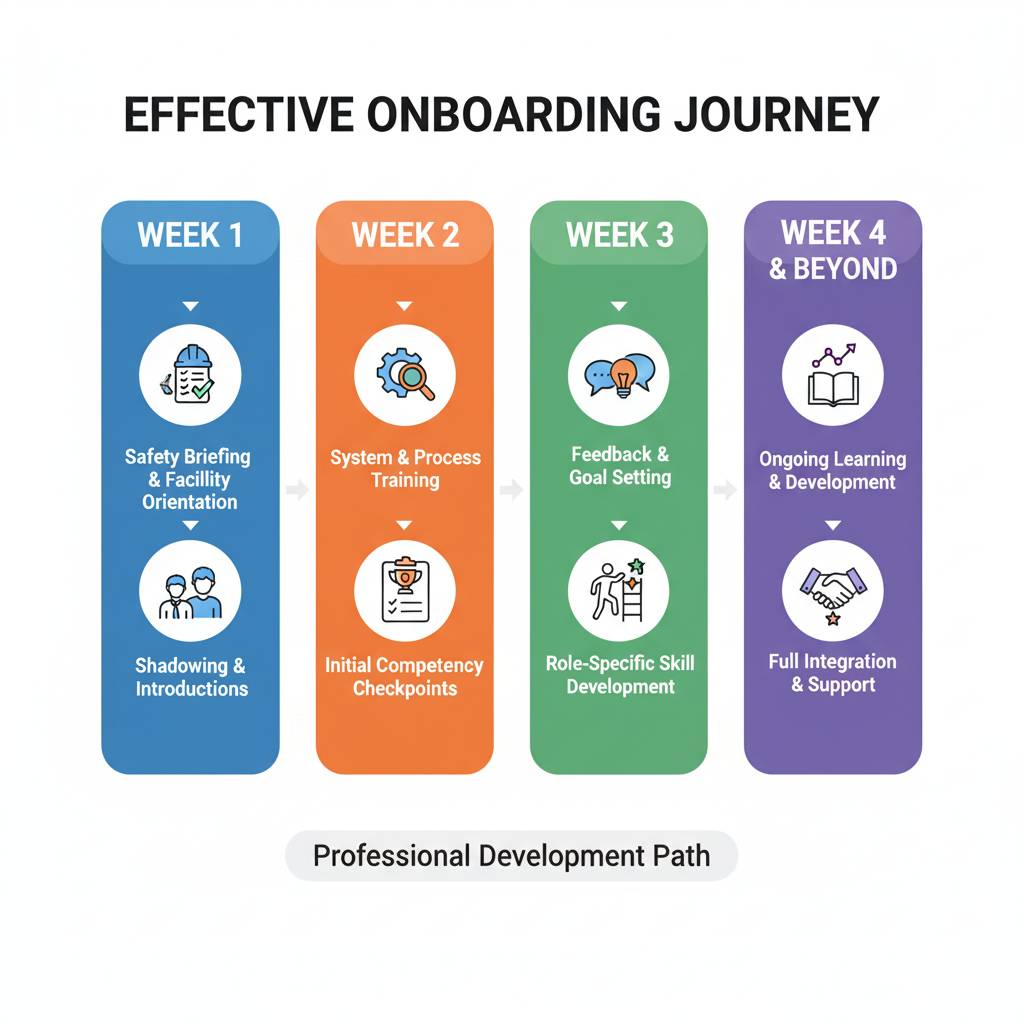We tell prospective clients that staff can learn our system in six minutes. It’s true. Six minutes of guided training and your team can navigate OpsPal, access procedures, log problems, and complete tasks.
But here’s what we don’t say in that pitch: six minutes of system training is not the same as six minutes of onboarding.
And if you think it is, you’re setting up your new starters—and your operation—for failure. This is particularly critical in UK leisure centres, where 40% annual staff turnover means effective onboarding isn’t optional—it’s essential for safety and retention
Let me explain why this matters, especially in an industry where high staff turnover means you’re constantly bringing new people into safety-critical environments.
System Training vs Staff Competence in Leisure Centres
I recently spoke with a leisure centre manager who was frustrated with their new digital operations platform. “They said staff would be trained in minutes,” she told me. “But we’re still having incidents where people don’t know what to do.”
The problem wasn’t the system. The system was fine. The problem was the assumption that showing someone how to use a tool is the same as teaching them how to do their job.
Think about it this way: I can show you how to use a spreadsheet in six minutes. That doesn’t mean you’re now competent to manage a facility budget. The tool is easy. The job is complex.
This confusion is everywhere in leisure operations. We’ve conflated “easy to use” with “replaces proper training.” We’ve convinced ourselves that digital systems are shortcuts to competence. They’re not. They’re tools that support competence, which is a completely different thing.
Essential Elements of Leisure Centre Staff Onboarding
Let’s be honest about what a new starter needs to know before they’re truly competent in a leisure facility role:
- Safety culture and vigilance: They need to understand why we do what we do, not just what we do. Why we complete pool plant checks at specific times. Why we never leave reception unattended. Why we challenge anyone acting suspiciously near changing areas. This is about instilling professional standards, not ticking boxes.
- Site-specific knowledge: Every building is different. Where are the isolation valves? Which door sticks? Where’s the spare key for the cupboard that everyone forgets about? What does that weird noise from the AHU actually mean? This is tribal knowledge that takes time to absorb.
- Emergency procedures in context: Reading an evacuation procedure is one thing. Understanding how it actually works in your building with your team on your shift pattern is something else entirely. They need to know who does what, where people struggle, what the building sounds like during an alarm, where members typically congregate.
- Customer service standards: What does good look like in your organisation? How do you handle complaints? What’s your approach to difficult conversations? When do you escalate? These are cultural standards that need modelling and practising, not just documenting.
- Equipment operation and maintenance: Yes, there’s a procedure for starting the pool filtration system. But what does it feel like when it’s working properly versus when something’s wrong? What are the early warning signs? When should you call for help? Experience matters.
- Safeguarding awareness: Policies are essential. But spotting concerning behaviour, knowing when something feels wrong, understanding how to respond appropriately—these are sophisticated skills that develop over time with good coaching.
- Team dynamics and communication: Who do you ask when you’re not sure? What’s the best way to log a problem so it actually gets seen? How do you handover between shifts? Where are the informal knowledge sources? This is organisational competence that no system can teach.
None of this happens in six minutes. None of it happens with a digital system alone. It happens through structured induction, good supervision, regular check-ins, and time.

How Digital Systems Support Leisure Staff Training
So where do digital operations systems fit into good onboarding?
Here’s what they should do:
Provide consistent reference points: Your new starter forgets the pool evacuation procedure. Instead of asking someone who might give them outdated information, they access the current procedure on their phone. The system acts as a reliable knowledge source, available 24/7.
Create structured learning pathways: Good systems let you build progressive competence. Week one, they’re accessing basic procedures. Week two, they’re completing supervised tasks. Week four, they’re working independently with confidence. The system tracks their progress, flags any gaps, and ensures nothing gets missed.
Support evidence-based development: You can see what they’ve accessed, what they’ve completed, and where they might need additional support. Their training record is live and accurate. No more spreadsheets that might be out of date.
Reduce cognitive load: Instead of trying to remember everything, they can access information when needed. This frees up mental space for the important stuff—like actually paying attention to what’s happening around them.
Enable consistent standards across sites: If you operate multiple facilities, digital systems ensure your new starter in Site A receives the same quality induction as someone starting in Site B. The procedures are identical. The expectations are clear. The training is equivalent.
But notice what’s missing from this list: the system doesn’t replace judgement, experience, cultural integration, or human coaching. It supports these things. It doesn’t replace them.
Best Practice Leisure Staff Onboarding UK
Progressive leisure operators are getting this right. Here’s what their onboarding typically includes:
Pre-start preparation: Before day one, new starters receive digital access to key policies, organisational values, and site information. They arrive with context, not completely cold. Some organisations use short video introductions from team members, virtual site tours, or overview documents. The first day is about people and culture, not paperwork.
Structured first week: Day one includes essential safety briefing, site tour, introductions, and supervised observation. Days two to five involve progressive responsibility—shadowing experienced staff, attempting tasks under supervision, asking questions, making mistakes in safe environments. The digital system provides the reference materials. Experienced colleagues provide the coaching.
Competency-based progression: Rather than time-based assumptions (“you’ve been here two weeks, so now you can work alone”), they use competency checkpoints. Can you complete this task safely? Can you spot these hazards? Do you know when to escalate? Demonstrate competence, progress to independence.
Regular check-ins: Weekly conversations in the first month, fortnightly in the second month, monthly thereafter. Not just “how are you getting on?” but structured discussions about what’s going well, what’s challenging, what additional support is needed. These conversations are documented and tracked.
Ongoing development beyond basics: Onboarding doesn’t end after the probation period. They continue building expertise—learning from incidents, attending refresher training, developing specialist knowledge, taking on additional responsibilities. The system tracks all of this, creating a clear development pathway.
Cultural integration: Probably the hardest part to quantify, but the most important. They need to feel part of the team, understand the unwritten rules, know who to ask for help, feel confident speaking up when something’s wrong. This happens through deliberate inclusion, not accident.

Tackling 40% Staff Turnover in UK Leisure Centres
I know what you’re thinking. “This sounds great, but we’ve got 40% annual staff turnover and mostly part-time contracts. We don’t have time for weeks of structured onboarding.”
I understand. The leisure industry’s employment patterns make comprehensive induction challenging. But consider this: the reason you’ve got high turnover might be because your onboarding is inadequate.
People leave jobs when they feel unsupported, incompetent, or unsafe. They stay when they feel confident, valued, and part of something professional. Good onboarding is how you create the latter.
And here’s the thing about digital systems—they make comprehensive onboarding more efficient, not more time-consuming. Your experienced staff aren’t constantly answering the same questions because new starters can access information independently. Your managers aren’t creating bespoke induction plans because the structured pathway already exists. Your training records are automatically maintained.
The time you invest in proper onboarding gets repaid in retention, competence, and reduced incidents.
The UK Leisure Industry Retention Crisis
The numbers tell a stark story:
– UK leisure and hospitality industries experience the highest staff turnover rates at 5.8% monthly
– 42% of new leisure industry employees leave within the first 90 days
– The average cost to replace a leisure centre employee earning £25,000 is £30,614
– UK employers invest £42 billion in employee training annually—yet poor onboarding wastes this investment
– 87% of HR leaders say staff retention is their top priority for 2025
For UK leisure centres, where safety-critical roles like lifeguarding and pool plant operation require extensive competence, poor onboarding isn’t just expensive—it’s dangerous. UK leisure centres require staff to hold NPLQ (National Pool Lifeguard Qualification] and other essential certifications. However, holding qualifications and being operationally competent are different things.
According to CIPD research on employee retention , the UK experiences 35% annual staff turnover, with leisure and hospitality sectors significantly above this. Research from Stribe shows that replacing an employee costs between 6-9 months of their salary.
Evaluating Your Leisure Centre Induction Programme
If you’re not sure whether your onboarding is fit for purpose, ask yourself these questions:
Could a new starter, working alone on a quiet shift, confidently handle an emergency without having to phone someone for guidance?
If your most experienced team member left tomorrow, would the knowledge they carry in their head be accessible to everyone else?
When you have an incident, is it often linked to someone not knowing what they should have known?
Do new starters frequently say things like “nobody told me that” or “I didn’t know where to find it”?
Are you seeing the same mistakes from different people, suggesting inconsistent training rather than individual competence issues?
If you answered yes to any of these, your onboarding needs attention. And throwing a digital system at the problem without addressing the fundamentals won’t help.
Using Technology to Enhance Leisure Staff Training
This article might seem like I’m arguing against digital operations systems. I’m not. I’ve spent years developing one. I believe they’re transformative when used properly.
But “when used properly” means understanding what they can and can’t do.
They can provide instant access to current procedures. They can’t teach someone why those procedures matter.
They can track training completion. They can’t verify someone truly understands what they’ve learned.
They can flag expired certifications. They can’t develop professional judgement.
They can streamline communication. They can’t build team culture.
The most effective operations combine excellent digital systems with excellent people development. The system provides the infrastructure. Your managers, supervisors, and experienced staff provide the coaching, culture, and context.
That’s not a six-minute process. It’s an ongoing commitment to building competent, confident teams who can deliver safe, high-quality experiences for your members and guests.
 Leisure centre manager conducting staff onboarding training with new lifeguard in UK facility
Leisure centre manager conducting staff onboarding training with new lifeguard in UK facility
Implementing Effective Leisure Centre Onboarding
If you’re implementing or already using a digital operations system, here’s how to ensure it supports (rather than replaces) good onboarding:
Use the system to document your complete induction pathway, not just system training. Build in checkpoints, competency assessments, and review conversations.
Train your supervisors and managers on how to coach effectively, not just how to use the software. The human element matters more than the digital element.
Create opportunities for new starters to access experienced colleagues. Pair them up. Schedule overlapping shifts. Build in shadowing time.
Monitor your early-stage turnover. If people are leaving in the first three months, your onboarding isn’t working, regardless of how slick your digital system is.
Ask new starters for feedback at regular intervals. What helped? What was confusing? What would have made the difference? Actually listen to the answers.
Review incidents and near-misses for onboarding failures. Was this a knowledge gap? A system issue? A cultural problem? Use incidents as learning opportunities to improve your induction process.
The Bottom Line
Six-minute system training is brilliant. It means technology isn’t a barrier. Your team can focus on their work, not wrestling with complicated software.
But never confuse ease of use with depth of competence.
Good onboarding in leisure operations takes weeks, requires human investment, and needs consistent commitment. Digital systems should make this easier, faster, and more reliable. They should never replace it.
Your members trust you to provide safe, well-run facilities. That trust is built on competent staff. Competent staff are built through proper onboarding. And proper onboarding is never a six-minute process.
Want to discuss how digital systems can support better onboarding?
Book a consultation to discover how OpsPal can help your facility build comprehensive induction pathways that develop truly competent staff.
Book Your Consultation
About the Author
This article was written by Craig Campbell, Director at OpsExcellence and creator of OpsPal digital operations software. Craig has over 30 years of experience in leisure facility management and is passionate about developing high-performing teams.